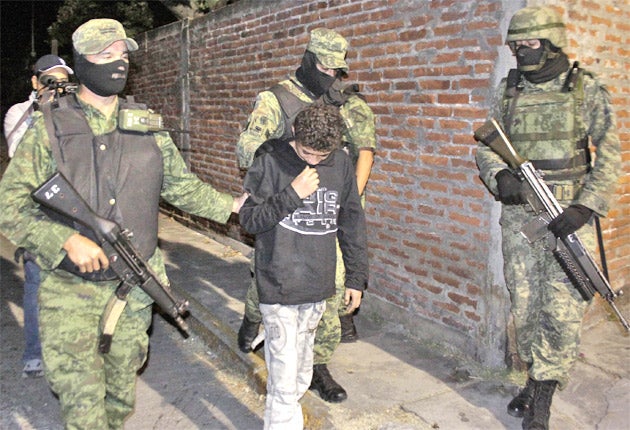Your support helps us to tell the story
From reproductive rights to climate change to Big Tech, The Independent is on the ground when the story is developing. Whether it's investigating the financials of Elon Musk's pro-Trump PAC or producing our latest documentary, 'The A Word', which shines a light on the American women fighting for reproductive rights, we know how important it is to parse out the facts from the messaging.
At such a critical moment in US history, we need reporters on the ground. Your donation allows us to keep sending journalists to speak to both sides of the story.
The Independent is trusted by Americans across the entire political spectrum. And unlike many other quality news outlets, we choose not to lock Americans out of our reporting and analysis with paywalls. We believe quality journalism should be available to everyone, paid for by those who can afford it.
Your support makes all the difference.A teenage boy who confessed to beheading and then disembowelling at least four men in the Mexican resort of Cuernavaca has gone on trial accused of working as a hitman for one of the country's most notorious drug cartels.
Edgar Jimenez Lugo, who is known by the nickname "El Ponchis" (the cloak), was taken into custody in December, shortly after the mutilated corpses of his alleged victims were found hanging from local bridges. He was 14 years old at the time of his arrest.
Prosecutors believe that the boy was first recruited by the Beltran Leyva organisation, which controls much of central Mexico, at the age of 11. He turned 15 in May, and is now facing charges of murder, kidnapping, drug-dealing, and the possession of illegal weapons. The trial is taking place behind closed doors because of the defendant's age. It has sparked widespread soul-searching over the so-called "war on drugs" declared by Mexican President Felipe Calderon in 2006.
More than 35,000 people have since died in drug-related violence, including roughly 1,500 children and teenagers. Around 4,000 juveniles have been detained by authorities. Jimenez faces around three years in prison under policies designed to rehabilitate young offenders.
Born in San Diego, to illegal immigrant parents who were also crack cocaine addicts, Jimenez is officially an American citizen. However he spent most of his childhood in a working class suburb of Cuernavaca, a popular weekend retreat a couple of hours south of Mexico City. When he was aged 11, he allegedly began working for Julio de Jesús Radilla Hernández, a representative of the Beltran Leyva cartel widely known as "El Negro."
Mr Hernández is believed to have employed a group of local teenagers to act as his foot soldiers in Cuernavaca. Their exploits shot to public attention late last year, when a video was posted online showing them torturing a man who was being held as a hostage. In the clip, shot on mobile phone cameras, a youth identified as "El Ponchis" was shown beating the hostage, who was gagged, bound, and dangling from the ceiling by his wrists. The footage prompted a police investigation into an apparent teenage assassin.
One Sunday morning last August, four bodies were left hanging from a bridge across one of the city's busiest roads. The dead men's severed heads and genitals were lying nearby, along with a note attributing the killings to the South Pacific Cartel, an offshoot of the Beltran Leyva organisation. Investigators swiftly attributed the crime to "El Ponchis".
In December, police acting on a tip-off arrested Jimenez and two of his sisters, as they prepared to board a flight to San Diego, where their mother still lives. The youth was then paraded before television cameras and claimed responsibility for having slit the throats of the four men, while under the influence of marijuana. However those comments are now considered inadmissible in the trial, under laws designed to prevent the police from using torture to extract confessions from suspects. The trial is expected to last for two weeks.

Join our commenting forum
Join thought-provoking conversations, follow other Independent readers and see their replies
Comments